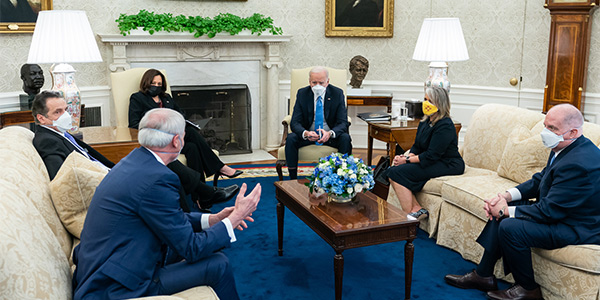In an executive order issued Wednesday, President Joe Biden ordered a review of a number of critical sectors — including energy — in order to “strengthen the resilience of America’s supply chains” ahead of future national emergencies.
The most immediate consequence of the order is a 100-day review of vulnerabilities in the supply chains of four products, to be spearheaded by relevant department heads in consultation with appropriate agencies:
- high-capacity batteries, including for electric vehicles, led by the secretary of energy;
- semiconductor manufacturing and advanced packaging, led by the secretary of commerce;
- critical minerals and “other identified strategic materials,” led by the secretary of defense; and
- pharmaceuticals and active pharmaceutical ingredients, led by the secretary of health and human services.
Additional reports are due within one year of the date of the order. Energy Secretary Jennifer Granholm’s report is to cover “supply chains for the energy sector industrial base,” as she defines it. Similar mandates were given to the secretaries of defense, health and human services, commerce, homeland security, transportation and agriculture.
Both the 100-day and the one-year reports are to include reviews of:
- critical goods and materials underlying the supply chain in question;
- other essential goods and materials, including digital products;
- prioritization of such materials based on statutory or regulatory requirements, importance to national security, and emergency preparedness;
- manufacturing and other capabilities needed to produce critical and essential goods and materials;
- contingencies that may disrupt, strain or compromise the supply chain — including the failure or exploitation of digital products and services, and reliance on foreign suppliers;
- the resilience and capacity of U.S. manufacturing supply chains, as well as its industrial and agricultural base, to support national and economic security in the event of such contingencies;
- primary causes of risks for the U.S. industrial base and supply chains;
- specific policy recommendations for ensuring resilient supply chains for the relevant sector; and
- prior actions by allies and partners in this regard.
In a signing ceremony for the order, Biden emphasized that “even small failures at one point in the supply chain can cause outsize impacts further up the chain.” He specifically noted the shortages of personal protective equipment that many hospitals have faced as a result of the COVID-19 pandemic, as well as the current scarcity of semiconductors that has led to slowdowns in production of cars and electronics. Biden called the semiconductor “a 21st century horseshoe nail,” referencing the proverb about a missing nail leading to the loss of a kingdom.
“While we cannot predict what crisis will hit us, we should have the capacity to respond quickly in the face of challenges,” the White House said in a statement. “The United States must ensure that production shortages, trade disruptions, natural disasters and potential actions by foreign competitors and adversaries never leave the [U.S.] vulnerable again.”
Biden’s order follows one issued by former president Trump last year that declared a national emergency related to the bulk power system supply chain and aimed to remove foreign-manufactured BPS equipment from certain utilities. (See Trump Declares BPS Supply Chain Emergency.) However, that order is currently suspended, pending the result of a 90-day review initiated by Biden as one of his first actions upon taking office last month. (See Biden Suspends Trump’s BPS Supply Chain Order.)





